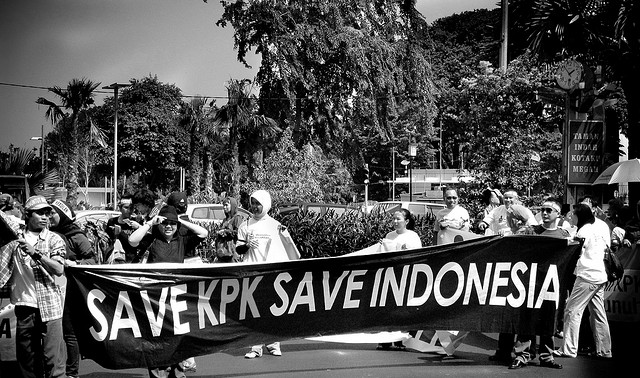
Many Australian observers of Indonesian politics may have assumed that the election of Joko Widodo as Indonesia’s seventh president would augur well for the bilateral relationship. After all, the former municipal governor came not from Jakarta’s political oligarchies, but appeared a humble, self-made entrepreneur and committed democrat.
Moreover, ‘Jokowi’, as he was affectionately termed, had a proven record of good governance and service delivery. His impromptu visits or ‘blusukan’ as Jakarta governor delighted residents of the capital, who’d grown tired of Indonesia’s corrupt and incompetent bureaucracy failing to deliver on service efficiencies.
For the international community, Jokowi’s victory illustrated the triumph of democratic values in Indonesia’s post-authoritarian political culture. His election policy platform (Visi Misi Program Aksi), for example, included strong commitments to corruption eradication, good governance and human rights. Furthermore, his election win at the expense of former Army general Prabowo Subianto, alleged perpetrator of serious human rights violations and proponent of democratic regression, was received well by the international community.
But in just over three months as president, Jokowi hasn’t quite turned out as the kind of president many foreign observers—and indeed Indonesians—expected. His commitment to democratic norms and good neighbourliness appears far more conditional.
This is evident in a number of domestic and foreign policy developments. First, Jokowi’s reluctance to exert his executive authority to end the latest battle between the Indonesian National Police (POLRI) and the Corruption Eradication Commission (KPK) has eroded his popular legitimacy. POLRI’s efforts to criminalise the KPK leadership in retaliation for their investigation of Commissioner General Budi Gunawan, who was approved recently as new police chief by both the parliament (DPR) and president, highlights just how far Indonesia has to go in terms of good governance and security sector reform.
Ironically, in the context of the POLRI–KPK battle, the fact that Jokowi doesn’t emanate from a security force background, unlike former generals Susilo Bambang Yudhoyono and rival presidential candidate Prabowo, proves more of an impediment than an advantage. A high-ranking military background would have most certainly given the president greater authority over Indonesia’s police force—which has a reputation for systemic corruption.
True, Jokowi’s policy choices and political behaviour can be understood as a manifestation of the political constraints he faces. Jokowi is beholden to Megawati Soekarnoputri’s political vehicle, the Indonesian Democratic Party of Struggle (PDI-P), to govern (at least for now). As such, Jokowi has little choice but to compromise with Megawati on key political appointments.
In the foreign policy realm, however, it’s Jokowi’s pragmatic, business-oriented mind, which sees diplomacy more in transactional terms rather than as a means of regional community-building and a vehicle for promoting human rights. Under Jokowi, Indonesia has become more nationalistic and uncompromising in its external relations. The razing of foreign vessels seized fishing illegally in Indonesia’s waters, for example, has rattled Indonesia’s neighbours. In addition, there are concerns Indonesia’s new cost-benefit calculus of diplomatic relations—evident in the prioritisation of trade and investment promotion—comes at the expense of Indonesia’s commitment to ASEAN.
Unfortunately, it’s now Australia’s turn to contend with the consequences of a different leadership style and changed policy focus in Jakarta. The impending execution of two Australian narcotics offenders, Andrew Chan and Myuran Sukumaran, represents a classic ‘intermestic’ policy dilemma for Australia, aside from a personal tragedy for the individuals and families involved.
Contending with elements of Australian civil society intensely critical of Indonesia’s human rights approach whilst pursuing close and constructive relations with Jakarta proved a significant policy challenge for Canberra during the decades of Indonesia’s repressive New Order regime. From the mid-1970s till 1999, for example, Australian human rights activists, trade unions, the West Papua lobby, church groups and pro-East Timor organisations railed against an Indonesia policy they considered unprincipled, whilst Canberra pursued national interests and regional stability through a cooperative working relationship with Jakarta.
Indonesia now looks set to enter a difficult political period with less appetite to compromise on what it identifies as its core national interests. That will have both domestic political and foreign policy repercussions for Australia. As the democratic consolidation achieved under SBY appears more fragile and Indonesia reverts to a more hardline policy approach, Australian governments will be forced to contend with conflicting policy imperatives. Sadly, Chan and Sukumaran are the current personification of such tensions.
Greta Nabbs-Keller is the director of Dragonminster Consulting, a Brisbane-based company providing Indonesia expertise to government and private sector clients. She is a non-resident research fellow of the Perth USAsia Centre. Image courtesy of Flickr user ivanatman.

